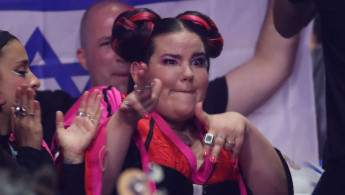Last-minute Eurovision deal secures Israel as 2019 host
Israel's public broadcaster said on Tuesday it had resolved a funding dispute that threatened the country's chance to host next year's Eurovision Song Contest, hours ahead of a European deadline.
Israel won rights to host the Eurovision contest after Israeli singer Netta Barzilai beat 25 other contestants in Lisbon in May with her song "Toy", in a contest watched by more than 200 million people around the world.
Israel's Public Broadcasting Corporation (IPBC) had warned Prime Minister Binyamin Netanyahu that the country might not be able to host the 2019 Eurovision, as disagreements over who will pay the 12 million Euro ($14 million) guarantee mounted.
IPBC has said that they are unable to foot the bill without firing 200 employees and have questioned Netanyahu's refusal to allocate a budget for the competition.
The corporation announced on Tuesday evening that "the Eurovision crisis is over!"
"The broadcasting corporation will today deposit the 12 million euros guarantee for hosting the competition," it said in a news report.
The guarantee is to cover cancellation of the competition in Israel in the event of circumstances beyond the corporation's control such as war or natural disaster, it added.
Should the broadcast from Israel have to be cancelled and the deposit forfeited, IPBC and the government would agree financial help for the broadcaster between themselves, the radio quoted the corporation's board as saying.
"Kan (IPBC) sees great importance in hosting the Eurovision in Israel for the state in terms of exposure and image and as an economic booster," the radio quoted management as saying.
"The corporation believes that the government of Israel will do all in its power to ensure the holding of a proper and dignified Eurovision in Israel and will fulfil its obligations."
Another possible obstacle to the show could come in the form of pressure on participants from the global Boycott, Divestment and Sanctions (BDS) movement against Israel over its occupation of Palestinian territory.
There are also concerns that ultra-Orthodox Jews may protest against violations of the Jewish Sabbath, preventing the event taking place on a Saturday night when it is usually held.
Netta's statement came at a time of heightened tensions after President Donald Trump broke with decades of US policy and moved his country's Israeli embassy from Tel Aviv to the contested city of Jerusalem.





 Follow the Middle East's top stories in English at The New Arab on Google News
Follow the Middle East's top stories in English at The New Arab on Google News
![Both Hamas and the Palestinian Authority welcomed the ICC arrest warrants [Getty]](/sites/default/files/styles/image_330x185/public/2024-11/GettyImages-2178351173.jpg?h=199d8c1f&itok=TV858iVg)

